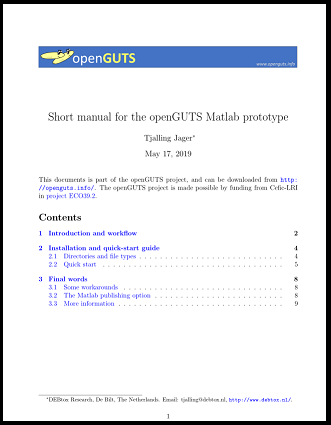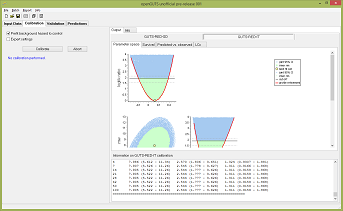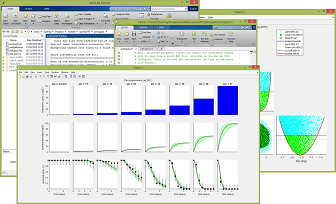General information on downloads
Register for warnings/updates.
Every software will contain errors. Even though
openGUTS is extensively tested, we are sure that it contains
errors. Some of these will be small glitches that are more
of a nuisance than a problem. However, there may be more
serious errors that affect the accuracy of the output, in
places were we did not test the software. We like to notify
the users as soon as possible when such an error is
identified (and offer possible workarounds). To this end, we
ask you to register for an email list by sending an email to
Tjalling Jager (see email at bottom of this page). This list
will only be used for information on important errors and
software updates.
License information.
openGUTS is free and open source software: you can
redistribute it and/or modify it under the terms of the GNU General Public
License as published by the Free Software
Foundation, either version 3 of the License, or (at your
option) any later version. This holds both for the
standalone version as for the Matlab version. This will
ensure that openGUTS will stay in the public domain. Information
about GPL on Wikipedia.
Errors in current versions (v.1.2)
None that we know of, but see the
list of 'known issues' downloadable below. For errors in
previous versions, please see the list at the bottom of this
page.
Standalone openGUTS software
Download setup file for the
standalone version (v.1.2 of March 2024, MSI file, 4.2
MB). Before installing this version, make
sure to uninstall previous versions of openGUTS. Note:
as of March 2023, the installer has been updated in
response to (false-positive) trojan warnings by some
virus scanners.
Download
the version log (TXT file, small).
Download user
manual for the standalone openGUTS software (7
June 2024, PDF, 3.1 MB). Updated to version
1.2.
Download the
example files: input data sets and exposure
profiles (9 Dec. 2019, ZIP file, 570 KB).
Download the list with known
issues and possibilities for future versions
(version 20 March 2024, PDF file, 323 KB). Updated
to version 1.2.
Download the source code
(v.1.2 of March 2024, ZIP file, 238 KB). Source for version
1.0 and 1.1. available on request.
The installer file will install the standalone
executable that runs on Windows PCs (Windows 7 and later).
The program was developed in C++. Since openGUTS is open
source, the source code is available for download as well.
Matlab version
Download Matlab version
(v.1.2 of 20 March 2024, ZIP file, 734 KB). Includes
example files.
Download the version/error log
(TXT file, small).
Download
short user manual for the Matlab version (9 Dec.
2019, PDF, 330 KB).
Take a walkthrough
through the code to see what it does.
The Matlab version (obviously) requires that you have Matlab
installed. It was designed in R2018a, but should work
error-free with version R2016b up to the current version
(last tested: R2023a). If you use Matlab 2014b-2016a, I
suggest to download v.1.1,
which has the same calculation engine as v1.1a (but will
throw an error for new Matlab versions as of R2023a).
The Matlab version has the same functionality as the
standalone version, but lacks the user interface and the
option to make formatted output reports. Both versions are
able to use the same input files for the data sets and the
exposure profiles. The Matlab version will be handy for
trying out modified GUTS models (e.g., more complex
TK/damage modules) or modified analyses (e.g., custom
graphs). Since the Matlab version was originally developed
as prototype for the C++ source code, both follow the same
structure, and the Matlab version can be used for future
development of the software.
Background documentation
The history and conceptual/mathematical explanation of
the GUTS framework is presented in detail in the GUTS e-book. The
documents below will not repeat that background, but will
assume that the reader is familiar with the e-book.
Download the
guide to the interpretation of openGUTS output (10
May 2020, PDF, 4.8 MB). This document gives
a short model summary, and runs through several case
studies: a well-behaved example to explain what the model
output means, but also several typical nasty cases.
Download the
technical design/background document (12 Dec.
2019, PDF, 690 KB). This document provides the technical
background for the software.
Download the
test results for openGUTS (14 Dec. 2019, PDF, 9.3
MB). Comparing the output of the Matlab
version (prototype v0.7) with the standalone (beta 1).
These are not the most recent versions, so an update is
needed. There will be small differences with
Matlab and standalone v1.1, when using IT and
time-varying exposure, due to the correction of the
error in v1.0, as specified at the top of this page.
Testing includes the GUTS ring test exercises plus
additional data sets, and also includes results with
BYOM, Morse/MOSAIC and Mathematica.
Other things
Download
the openGUTS poster as presented at the 30th SETAC Europe
conference held in virtual space, 3-7 May 2020.
The algorithm used in openGUTS for optimisation and
uncertainty analysis has been published in the open
literature as well:
Jager, T. (2021). Robust likelihood-based approach for
automated optimization and uncertainty analysis of
toxicokinetic-toxicodynamic models. Integr. Environ.
Assess. Manag. 17(2):388-397 https://doi.org/10.1002/IEAM.4333.
Download accepted
version.
Download
supporting information. The supporting
information for this publication provides a detailed
explanation of the algorithm and the underlying statistical
framework.
Errors in previous versions
Error in v.1.0.
The IT calculations used a shortcut that did not work in
all cases. This error will affect IT calibrations
for time varying exposure, where the exposure scenario
includes episodes of linear decrease over time (for
constant exposure and block pulses, it will be fine). It
will also affect IT LPx predictions when the
exposure scenario is specified with a crude resolution
(the hourly resolution of FOCUS profiles will lead to
negligible errors). This error is repaired in the update
of the standalone and Matlab version, to v.1.1. Download a PDF document
explaining this error in detail. (first posted
19 May 2020, updated 25 Feb. 2021)
Matlab R2023a throws
errors (v.1.1 and earlier). The newest
version of Matlab does not allow the cell-array format for
name-value pairs anymore, at least not in the way it was
used in the openGUTS Matlab version for formatting text in
figures. Matlab versions up to 2022b do not have this
problem. (thanks to Amund for spotting and reporting
this). The update to v1.1a solves this issue (6 April
2023). However, the new version will no longer support
Matlab R2014b-R2016a. If you are still on such an ancient
platform, I suggest to keep working with v.1.1 (the
calculation engine has not changed with v1.1a). (posted
29 March 2023, updated 6 April 2023)
OpenGUTS
standalone (v.1.1 and
earlier) produces
error for missing
observation at last
time point. The
openGUTS standalone (v.1.0
and v.1.1) throws an error
when using a data set for
survival, with
time-varying exposure, in
which there are one or
more missing values at the
last time point. The error
occurs while the program
tries to plot the results
after the calibration. The
Matlab version does not
have this problem. A
workaround for the
standalone would be to
split the data set in two,
such that there are
observations at the last
time point for each data
set. (thanks to
Jan for
spotting and
reporting
this). NOTE:
if you split
up the data
set, it is
likely that
one of the
data sets no
longer has a
control
treatment.
This is fine,
but make sure
that the
option ‘Define
control group’
on the tab
'Input Data'
is set to
<No control
group> for
this data set!
Otherwise, the
openGUTS
standalone
will, by
default, take
the first
treatment in
that data set
as a control.
The type of
data set that
produces an
error, and the
solution
splitting up
the data set,
are explained
with a simple
example in this
PDF. This
error is
repaired in
the update of
the standalone
to v.1.2. (posted
5 April 2023,
updated 20
March 2024)
|
openGUTS standalone Windows executable
openGUTS in Matlab

Manuals and documentation
|




